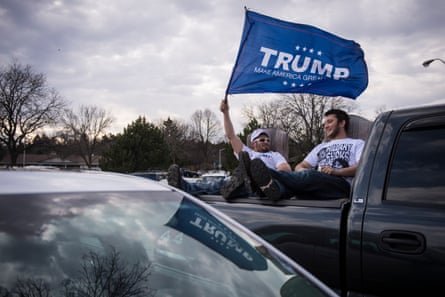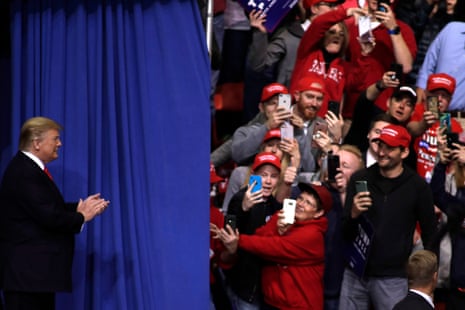Donald Trump has divided the country, communities and families like no other president in recent times. In Forest county, in the upper reaches of rural Wisconsin, he’s also torn apart the pocket-sized Republican party.
“I had a really good friend,” said Terri Burl, chair of the county GOP. “She was vice-chair of the Republican party. I’ve known her for so long. We went to the conventions together. Now she’s a Never Trumper. We don’t speak.”
The friend, Jennifer Nery, was never a Trump enthusiast but she voted for him as a loyal Republican and under pressure from a sister who was deeply hostile to Hillary Clinton. Now she regards it as a mistake and identifies with the “Never Trump” movement in active opposition to the president.
“I’ve always voted Republican. I don’t think I’ve ever voted for a Democrat. I will be voting Democrat in 2020,” said Nery, a semi-retired farmer who looks after rescue animals. “It’s caused internal strife with some of my family members who said: ‘Jennifer, but Hillary …’ I voted the least of two evils but now I regret every minute. If could go back in time, I would have cast it for Hillary.”

That is not good news for a president who cannot afford to lose voters in Wisconsin and hope to hold on to a state that proved an important part of the electoral college puzzle that put him in the White House.
The split between the two women reflects a deepening polarisation over the president in the sparsely populated rural county that was among 19 in Wisconsin to flip from backing Obama to supporting Trump in 2016. In doing so, Forest county, which has in recent times consistently backed presidential election winners of either party, helped deliver the president a state he had not expected to win. These Obama-to-Trump swing voters may again prove crucial next year.
But 2020 offers Trump a different challenge. He took Wisconsin with a huge swing in rural areas but still won by less than 23,000 votes, a margin of just 0.77%. With polls showing rising support for the Democrats in Wisconsin’s main cities, the president not only needs to take rural counties again but increase his backing there to offset his opposition’s gains elsewhere.
The flipping of counties from Obama to Trump in the midwest – and the apparent paradox of Americans shifting from Obama to a man denounced as a misogynist, racist and bully – was instrumental in the president’s victory.
This week, and at various stages in the run-up to the 2020 presidential election, the Guardian is reporting from three midwest counties that swung from Obama to Trump in crucial states.
Q&AWhat’s the swing voters series about?
Show
The voters who swung to Trump
Voters swung from Barack Obama to Donald Trump in Michigan, Wisconsin and Iowa in 2016’s presidential election – helping propel him to a narrow victory.
Chris McGreal will report from three key swing voter counties in these states as the 2020 election campaign unfolds, regularly travelling around them, talking to voters, workers, business owners, party activists and strategists.
Will these voters stay with Trump in 2020? Our series will feature regular in depth reporting from:
- Monroe county, Michigan. Trump won 58% of the vote in 2016 in this mainly white, working class county of around 150,000 people, which is about 25 miles south of Detroit. Some industrial jobs remain in steel and at a nuclear power plant but those who needed to move to find work frequently took non-unionised jobs in healthcare.
- Forest county, Wisconsin. The northern rural county voted overwhelmingly for Trump having twice backed Barack Obama. In 2008, Obama took 56% of the ballot in the county. Eight years later, Trump won 61%.
- Howard county, Iowa. One of a bloc of agricultural counties in northeastern Iowa that flipped by large margins and helped deliver the state for Trump. In 2012, it voted 60% for Obama. Four years later, the county went 58% for Trump.
Burl said the county has become so polarised over the president she struggles to get even solid Trump supporters to turn out and campaign for him.
“Behind the scenes they know who they’re going to vote for but people don’t want to say that they’re for Trump. They’re embarrassed to. I’m embarrassed sometimes with things he says and how he says them,” said Burl, a substitute teacher who worked with disabled people and victims of domestic violence.

And now there are the impeachment hearings to contend with. Burl sees Trump’s supporters discounting the investigation as just another witch-hunt in the way that Robert Mueller’s investigation failed to persuade them the president had colluded with the Russians.
“They don’t talk about Russia any more. That was $34m of our wasted tax money talking about Russia for two and a half years. Russia didn’t work out for them so now they’re on to the next big inquiry,” she said. “I just think the Democrats wanted to impeach him. From the time he won the election, they started talking about it. Impeachment, impeachment, impeachment.”
Burl doesn’t discount the possibility that revelations down the line may further damage the president’s reputation with some of those who voted for him. But she is sceptical that it will affect many votes.
“It’s not that it’s some big October surprise because we still have a year before the election. I think this would hurt him more if this were happening a year from now. I hate to say this but maybe the Democrats did this at the wrong time,” she said.
Jobs
Forest county is home to not much more than 9,000 people living across about 1,000 square miles. About 80% of the residents are white and 15% Native American.
As in a lot of struggling midwestern counties, the major employers are public service jobs such as heathcare and education alongside manufacturing and the retail trade. But Forest county still has a couple of hundred people employed in forestry and agriculture. Wages are low and the median household income is about $43,000, not much more than two-thirds of the national average. A high proportion of residents are drawing disability payments, a common form of de facto welfare for those below retirement age.
It’s this unrelieved economic struggle that underpins the surge in votes for Trump in 2016, and Obama before him, as people in Forest county and other parts of rural Wisconsin search for leadership to shift the system in their favour.

Wisconsin could again prove an important part of the electoral college puzzle in Trump’s fight to stay in the White House. The Democrats have learned from Clinton’s mistake of assuming Wisconsin was a safe bet. She did not visit the state once during her presidential campaign.
Democrats have been organising. Anger at Trump and increasing activism appears to be strengthening support for the party in cities like Milwaukee and Madison. In last year’s midterms, the Democrats increased their share of the vote in all but one of the state’s seats in the US Congress.
Nery has friends who voted for Trump and regret it. But she said voters in Forest county often keep quiet about politics because differences over the president generate so much anger on both sides.
“A lot of people don’t want to tell whether they’re Republican or Democrat.’’ Burl said that while she believes support for Trump in the county remains firm, she agreed that people are increasingly shy about publicly declaring their backing or dissent.

Of all the nests the president has stirred, perhaps none has inflamed anger quite like immigration. Trump’s portrayal of asylum seekers flooding across the US’s southern border, and claim that they pose a security threat, as well as his at times vitriolic language to describe immigrants has riled public opinion.
“My father was born in Greece,” said Burl. “He came over here and he became a citizen the right way. With people being able to come across the border there is no guarantee that terrorists won’t come across the border either.”
It’s not clear though that the issue is playing as well as Trump would like. A poll by Marquette Law School showed rising tolerance of immigration in the state with 65% saying immigrants make the country a better place while just 4% said they are to the detriment of Wisconsin. Still, the most recent poll showed that nearly one-third of the state’s residents “feel like strangers in their own country”.
Nery thinks Trump is certainly doing things no president has done before but they do not include fulfilling the promises he made to “drain the swamp” and put the interests of ordinary Americans first. For the first time in her life, she is scouting out a Democratic candidate to vote for.
“I’m still a conservative. I don’t want somebody who says Medicare for All [public health insurance] and we’re gonna rip everybody’s guns apart. I actually like Pete Buttigieg. He would be my pick if there was a primary right now because he sounds intelligent and he’s a veteran. I like a military man,” she said. “When I said this about Pete Buttigieg to my sister, the first thing she said is: ‘Well, he’s gay. It’s an abomination.’ So is it OK to have relations outside your marriage with another woman? So what about Trump? When I throw that back at my sister all she says is, ‘He’s gay though.’”
Burl is watching the Democratic primary race with concern.
“Republicans are worried that some nutjob Democrat is going to win the nomination,” she said. “If Joe Biden were to win I wouldn’t feel catastrophic about it. But some of the other Democrats are coming out with a lot of crazy ideas. That doesn’t appeal to average Americans, even Democrats. Not in the midwest anyway.”
In the meantime, she is not waiting to find out who the opposition candidate is. She’s already gearing up to repeat Trump’s victory in Forest county.
“I want to get a life-size Trump. I want Trump to be in everybody’s mind. Everywhere they look I want them to see Trump over the next year,” she said.
